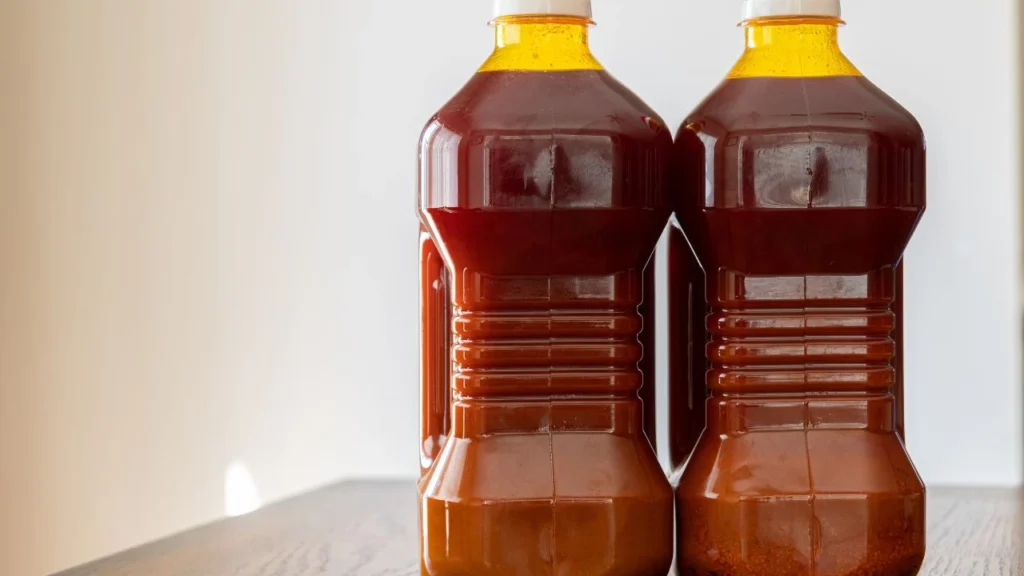As a chef, I know the kitchen generates gallons of used cooking oil every day. But many people overlook why used cooking oil is valuable. This leftover oil is not just waste; it is a resource with incredible potential. Recycling it creates biodiesel, a cleaner fuel that reduces greenhouse gas emissions by up to seventy-four percent. Beyond fuel, it also supports industries like aviation and oleochemicals. Restaurants can earn rebates and lower disposal costs by recycling oil responsibly. With the growing demand for sustainable energy, used cooking oil plays an important role in building a greener future.
Introduction to the Value of Used Cooking Oil
The value of recycling used cooking oil today is huge. It’s no longer just waste, but a precious resource. It brings big economic advantages of reusing used cooking oil in different sectors.
The market for used cooking oil was worth $6.6 billion in 2023. It’s growing fast. Firms like Mahoney Environmental, linked with Neste in the US, recycle oil from over 55,000 places. This includes places like restaurants and schools. They show a strong example of how to collect and use this oil again.
- Economic Benefits: Recycling cooking oil promotes a circular economy. This process turns what would be waste into useful products. It’s used in biodiesel, cutting greenhouse gas emissions by up to 86% compared to standard diesel.
- Environmental Impact: Turning used cooking oil into renewable products lowers the risks of wrong disposal. Incorrect disposal can pollute a lot of water.
- Market Dynamics: There’s a big demand for green raw materials, making used cooking oil a hot market. Competition and new technologies in oil cleaning make it even more attractive for investors and business people.
Neste’s partnership with McDonald’s in the Netherlands is a great example. Together, they transform used cooking oil into renewable items. This kind of teamwork not only grows the market. It also helps the planet by supporting global sustainability goals.
Knowing how economic advantages of reusing used cooking oil work is crucial. It aids stakeholders in making smart choices about dealing with and refining this oil. This helps companies grow while also protecting our world. It’s a double win, helping both the economy and the environment.
In addition to these economic benefits and analytics, we have also prepared specific step-by-step recommendations on what to do with used cooking oil.
The Environmental Impact of Recycling Used Cooking Oil

Recycling used cooking oil is key in today’s drive for sustainability. It not only helps businesses but also reduces environmental harm. This recycling process is vital for lowering environmental damage and encouraging a mindset of resourcefulness and responsibility.
Reduction in Landfill Waste and Water Pollution
Recycling used cooking oil cuts down waste going to landfills. It also tackles water pollution. Every gallon recycled means one less gallon harming our waste systems or waterways.
This helps protect aquatic life and maintain clean water, making a big difference to the environment.
Lower Greenhouse Gas Emissions Compared to Traditional Disposal Methods
Converting used cooking oil into biodiesel slashes greenhouse gas emissions. This is done through a process called transesterification. It makes a clean diesel alternative from the used oil.
This use of old resources for new, cleaner energy is a win for the environment.
Conservation of Natural Resources by Replacing Virgin Materials
Recycling used cooking oil saves natural resources. Disposing of it the old way harms the environment more. Recycling means we use less new materials for energy.
This saves those materials and lowers energy production’s carbon footprint.
Role of Used Cooking Oil in Sustainable Aviation Fuels
Recycled used cooking oil is crucial for greener aviation fuel. This showcases the oil’s versatility and helps the aviation industry go green. It fits their goal of reducing their environmental footprint.
Using eco-friendly disposal methods for used cooking oil helps the planet and businesses. It’s a way for restaurant owners and chefs to connect with eco-conscious consumers. It also shows their brands care about the earth.
Economic Value and Market Demand for Used Cooking Oil
The used cooking oil market is growing fast. This is because businesses around the world are looking for greener energy sources. Understanding the market and its dynamics shows that recycling cooking oil is good for both the planet and the economy.
Growing Global Market and Projected Growth Trends
In 2023, the value of the used cooking oil market was $6.4 billion. By 2034, it’s expected to hit $11.8 billion, growing at a rate of 5.8% annually. This increase is driven by a rise in eco-friendly practices across different areas and industries. Europe is a major player here, with countries like Finland, Germany, and the Netherlands leading in imports. This shows their strong commitment to the environment and renewable energy.
Factors Influencing Price Fluctuations
Several things impact the prices of used cooking oil. These include global demand, how much is available from homes and businesses, and energy policies. Price changes are often seen before geopolitical events, highlighting how sensitive the market is to external factors.
Industries Driving the Demand
- Biodiesel: Biodiesel demand, especially in North America, is pushed up by environmental laws and rising fuel costs.
- Animal Feed: Used cooking oil is an affordable, nutritious alternative for animal feed. It improves health and lowers feeding costs.
- Oleochemicals: Used in creating soaps, lubricants, and bio-products, UCO cuts reliance on petrochemicals.
Opportunities for Businesses to Monetize Used Cooking Oil
There are many ways businesses can make money from used cooking oil. By setting up recycling systems, they turn waste into something valuable. Turning UCO into biodiesel not only helps with clean energy but also creates new revenue opportunities. This is particularly clear in California, where biofuel use has significantly increased.
Applications and Uses of Recycled Cooking Oil

Exploring the world of uses for used cooking oil shows how we can be sustainable and innovative. This effort helps the environment and adds value to different industries.
Biodiesel Production and Its Benefits
Used cooking oil plays a big role in making biodiesel. This reduces our need for fossil fuels and lowers carbon emissions. Chevron Renewable Energy Group turns used oil into quality biodiesel, cutting emissions by 83%.
The glycerin byproduct is used in drugs and cosmetics. It’s a great example of making value from waste.
Animal Feed Manufacturing
Recycled cooking oil boosts the nutrition in animal feed. After cleaning it of impurities, it’s added to feed. This improves the energy content and supports the health and productivity of farm animals. Many mills and farms nationwide use this method.
Oleochemical Industry Applications
In the oleochemical industry, recycled oil helps make soaps, lubricants, and plastics. Its use shows how recycled oil can cut the need for new resources. It helps meet sustainability goals while finding innovative ways to use recycled cooking oil.
Emerging Uses – Sustainable Aviation Fuels, Bioplasticizers, and Industrial Lubricants
New technologies are finding more uses for used cooking oil. Its use in sustainable aviation fuels is changing how we think about flying. Used oil is also turned into bioplasticizers and industrial lubricants. This is leading to a more sustainable manufacturing world.
The range of innovative uses for recycled cooking oil is growing. It shows the oil’s value beyond being waste. Using it again helps protect our planet and sparks green innovation in many fields.
The Recycling Process From Collection to Reuse
The journey of used cooking oil (UCO) from collection to becoming biodiesel is fascinating. It shows us the environmental benefits. It also tells us why it’s important to recycle used cooking oil.
Collection Methods from Restaurants and Food Service Establishments
Getting UCO from restaurants properly is key. Leading companies collect it regularly without making a mess. They use special gear. This helps different food places keep working smoothly.
Filtration and Purification Processes
After collection, UCO must be cleaned. First, food bits and dirt are removed. Clean oil means high-quality biodiesel later. Then, UCO is further cleaned with high-tech methods. This step gets it ready for the next stage. It also cuts down on waste, helping the environment.
Conversion into Usable Products
- Biodiesel Production: Mainly, clean UCO turns into biodiesel. This is better for the planet than regular fuels. Making biodiesel helps lower harmful gases in the air.
- Revenue Generation: Turning UCO into biodiesel also makes money for businesses. It turns waste into something valuable in the eco-friendly energy market.
Technological Advancements in the Recycling Process
New technology makes recycling UCO better and more efficient. The latest machines and methods get more oil out of UCO. This is good for both the planet and businesses. Recycling UCO is getting better with new innovations.
Using advanced recycling methods helps businesses lessen waste. It also helps them follow the law. Most of all, it supports using resources wisely for a better planet. Encouraging UCO recycling in food services meets big sustainability goals.
Challenges and Opportunities in the Used Cooking Oil Industry

The path from used cooking oil to a valuable product is full of challenges and opportunities. The global recognition of recycling benefits has also spotlighted its complexities and possibilities.
Theft and Black Market Issues
The industry faces major challenges with theft and black market sales. The value of used cooking oil has led to an increase in illegal activities. Thieves often steal UCO from storage areas and sell it unlawfully. This results in big losses for businesses and harms the environment by avoiding proper recycling pathways.
Regulatory Challenges and Compliance Standards
Keeping up with changing regulations is a major challenge. Countries are setting stricter rules on how UCO must be handled and recycled. People in this industry must constantly learn and adapt to these regulations.
Emerging Markets and Global Demand
Even with these challenges, recycled UCO has a growing global market. The market is expanding by 4% each year, nearing 600 million USD. Emerging markets are exploring the benefits of UCO recycling. This demand helps in producing biodiesel and other bio-based products, reducing the use of new resources.
Role of Technology in Overcoming Challenges
Technology is vital in solving these issues. Innovations like advanced tracking prevent theft and keep recycling processes honest. Also, better processing methods allow recycling of UCO with more impurities, making it cheaper and more efficient.
Companies are making significant strides with new technologies. For example, new catalytic processes can turn dirtier UCO into high-quality biodiesel. This makes operations more efficient and offers an eco-friendly alternative to traditional fuels.
The Future of Used Cooking Oil Recycling

Recycling used cooking oil is now a key part of waste management. It helps save the environment and creates renewable resources. Looking ahead, turning used cooking oil into new products can change how we handle waste. It can also reduce the harmful effects of throwing away used cooking oil.
Projected Market Growth and Innovations by 2032
The next ten years look bright for recycling used cooking oil. Companies like Neste are using advanced technology to turn used cooking oil into renewable products. This innovation will make the market grow. The need to recycle used cooking oil is becoming more recognized around the world.
Focus on Sustainable Aviation Fuels
Making Sustainable Aviation Fuel (SAF) from used cooking oil is a major step forward. Airlines are using SAF to lower their carbon emissions. Compared to fossil fuels, SAF can cut greenhouse gas emissions by up to 95%. This shows how recycling used cooking oil can have a big effect in important industries.
Increasing Adoption of Circular Economy Practices
The push for a circular economy is growing, with the used cooking oil sector leading the way. Circular strategies aim for no waste and to keep resources in use. McDonald’s is turning its used cooking oil into renewable fuels. This is a strong example for other companies to do the same.
Opportunities for Businesses and Investors
Used cooking oil is a great opportunity for businesses and investors. It’s good for the environment and can also make money. As the industry grows, there will be more chances to create new products from used cooking oil. The demand for raw materials is also set to increase, making this a growing market.
In conclusion, recycling used cooking oil is getting more attention for its sustainability. There are many opportunities for growth and innovation. If you’re a chef or restaurant owner, being part of this movement can help the planet. It also puts your business at the forefront of ecological responsibility.
Conclusion
Throughout this article, we’ve seen how vital it is to reuse used cooking oil. Making biodiesel from this oil is a key way to help our planet. It cuts down harmful gases and supports environmental health. Reusing cooking oil isn’t just good for the Earth—it also saves money for food businesses. It can reduce the cost of getting rid of waste and even bring in extra cash.
In addition to proper disposal, there are also ways to manage frying oil that can help extend its life, so it is necessary to work towards both proper disposal and proper use of the oil. These practices can further reduce waste and improve sustainability efforts.
The benefits also reach our communities. Recycling cooking oil creates jobs and helps the economy while saving resources. It means we rely less on new materials and take better care of our planet. Plus, educating people and getting them involved shows how we all play a part in a greener future.
The growing success of recycling used cooking oil showcases its potential in the green market. It offers a way for food professionals to reduce expenses while staying eco-friendly. This process turns what used to be thrown away into something that boosts both the economy and the environment. It’s a smart step in the journey toward environmental care and sustainable business.
FAQ
Why is used cooking oil considered valuable?
Used cooking oil is valuable because it can be made into biodiesel and sustainable aviation fuel (SAF). It can also become animal feed and oleochemicals for consumer products. Its repurposing reduces environmental harm, making it desired by many industries.
What are the benefits of recycling cooking oil?
Recycling cooking oil helps the environment by lowering landfill waste and water pollution. It also cuts down on greenhouse gas emissions. This practice saves natural resources and supports sustainable fuel production, benefiting the economy too.
How does recycling used cooking oil contribute to environmental preservation?
Recycling cooking oil lessens landfill waste and water pollution. It turns into eco-friendly products like biodiesel. This prevents harmful substances from being released during disposal and saves non-renewable resources.
What drives the market demand for used cooking oil?
The demand for used cooking oil is rising because of the need for sustainable products and renewable energy like biodiesel. Its use in animal feed and oleochemical industries boosts the market. Businesses benefit by selling their used cooking oil.
How can restaurants and food service establishments benefit from recycling cooking oil?
By recycling cooking oil, establishments cut waste disposal costs and can earn from selling the oil. This supports sustainability, improving their image among eco-friendly consumers. It aligns with their social responsibility goals too.
What innovative uses for recycled cooking oil are emerging?
Recycled cooking oil now goes into making sustainable aviation fuels and bioplasticizers. It’s also used in industrial lubricants and in producing plastics and soaps. These new uses show the growing sustainability in various sectors.
Resources
https://nwbiofuel.com/waste-to-wealth-the-value-chain-of-used-cooking-oil-recycling/
https://longviewenv.com/unlocking-value-how-used-cooking-oil-becomes-sustainable-energy/
https://www.neste.com/news-and-insights/innovation/used-cooking-oils
https://liquidrecover.com/important-statistics-on-used-cooking-oil
https://mopac.com/2024/02/21/the-impact-of-used-cooking-oil-recycling/






